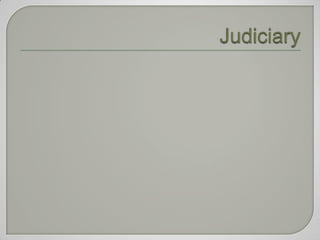
Judiciary
- 1. Judiciary
- 2. The Constitution Vague in regards to the courts Only the Supreme Court is mentioned “The judicial Power of the United States, shall be vested in one supreme Court, and in such inferior Courts as the Congress may from time to time ordain and establish.” How did we get federal courts?
- 3. Basic Structure District Courts Appellate Courts Supreme Court
- 4. Specialty Court “Legislative Courts” Highly specialized US Claims Court US Court of International Trade US Court of Military Appeals
- 5. District Courts 94 Total Only federal court with a jury Original jurisdiction Criminal and Civil Cases ~80% are civil cases
- 6. Codes Civil Criminal What is the difference?
- 7. Civil Law Copyright 2006 Prentice Hall
- 9. Criminal Law
- 11. Circuit Court of Appeals Jurisdiction? Question of legality, not fact 3-Judge panel receives briefs, hears oral arguments Decision usually binding
- 12. Appellate Courts The 11 Numbered U.S. Circuit Courts of Appeals
- 13. Procedures Panel reviews evidence Decisions lead to precedent A judicial decision that serves as a rule for settling subsequent cases of a similar nature
- 14. Stare Decisis “stand by decisions” The foundation of our legal system Allows citizens to know what is expected, without a law for every possible activity
- 15. Supreme Court
- 16. United States Supreme Court The Supreme Court is the final arbitrator for matters concerning federal laws and the U.S. Constitution
- 17. Supreme Court Currently 9 Justices Set by Congress 8 Associate Justices, 1 Chief Justice
- 18. Jurisdiction Congress determines appellate jurisdiction Once forced by law to review all necessary cases 27 million criminal and civil cases per year in US; Supreme Court hears ~80
- 19. Writ of Certiorari “Certs” for short An order from the Court to lower courts demanding they send a case’s records The court has agreed to CONSIDER the case 8000-9000 cert petitions per year
- 20. Granting a Cert “Rule of Four” 4 Justices must rule in favor of a cert If denied, the lower court’s ruling stands More likely to be granted if 2 lower courts have reached opposite conclusions
- 21. After the Cert Legal briefs are invited and submitted Amicus Curiae “friends of the court” Plenary Session Open to the public
- 22. Plenary Session All 9 Justices Present Oral arguments (30 min. each side) Justice William O. Douglas “This lawyer was done twenty minutes ago, but he didn’t know it.”
- 23. Deliberation Justices discuss the case Closed doors Each side states position Position is not final until it is made public
- 24. Written Opinion “Majority Opinion” or “Opinion of the Court” Gives legal reasoning for the decision Senior Member or Chief Justice assigns a member to write
- 25. Concurring Opinion Provides an alternative legal reasoning, even if a Justice voted in the majority Sometimes all will write their own opinion
- 26. Dissenting Opinion The Reasoning of the Minority
- 27. Remanding Decision sent to the lower court The lower court carries out the decision
- 28. Eligibility Nominated by the President Confirmed by the Senate Qualifications Constitution is vague Hold office “during good behavior” Retirement, death, impeachment
- 29. Politics Politics often influences nomination and confirmation Harriet Miers
- 30. The Constitutional Court Article III Nothing on qualifications Vague on Powers Vague on Duties Judicial Review is implicit
- 31. Judicial Review The power of the Court to rule on the constitutionality of state, federal, and executive actions THE role of the Court Was this intended???
- 32. Judicial Review??? Jefferson & Madison Congress and the President knew the intent of their laws; they should decide Hamilton Judicial Review needed as a check Do not assume leaders will act constitutionally Judiciary free from political, popular pressures; know the document best
- 33. Marbury v. Madison (1803) THE MOST IMPORTANT SUPREME COURT DECISION EVER!
- 34. Background Adams loses to Jefferson in election of 1800 Federalists also lose both Houses Federalists stacked the courts Appointments were never delivered
- 35. Jefferson takes Over Finds appointments, refuses to deliver commissions William Marbury, a would-be appointee, sues Requested a Writ of Mandamus
- 36. Writ of Mandamus A court order compelling a public official to act
- 37. Marshall Was Secretary of State under President Adams Was now the Chief Justice under Jefferson James Madison was the current Secretary of State
- 38. Marshall’s Dilemma The Court would surely favor Marbury What if Madison refused to comply? Court would have impotence precedent If it favored Madison, it would be disregarding the law
- 39. Marshall’s Solution Sided with Jefferson/Madison Marbury was entitled to his commission Madison broke the law in not delivering How pro-Jefferson? The court ruled Writs of Mandamus violated the Constitution Had no power to compel Madison, and did not have jurisdiction on the case
- 40. Reasoning Marbury was entitled to his commission Court did not have power to issue a Writ of Mandamus to the Secretary of State
- 41. The Court Wins Court seen as benevolent Judicial Review is established
- 42. Judicial Review Not used often ~100 times total Over 1000 local and states laws have been overturned
- 43. Democratic? The Court is not accountable to the people, but can void the actions of those who are Acts as a check for minority rights
- 44. Federal Judges’ Protected Tenure Federal judges can only be removed from office by impeachment by Congress if they commit a crime How does this lack of accountability shape their decisions?
- 45. Judicial Selection in the States Partisan elections Nonpartisan elections Merit selection Gubernatorial or legislative appointment
Notas do Editor
- CivilRegulates legal rights and obligations of citizens in regard to reach otherCriminalOffenses against society as a whole